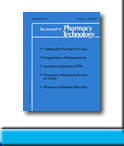 |
 |
ASSESSING HOME HEALTH
CARE PHARMACISTS' KNOWLEDGE OF CYTOCHROME P450 PHARMACOGENETICS
Janyce F Rogers and Robert S Kidd
To request full article click here.
OBJECTIVE: Genetic code governs cytochrome P450 activity as a consequence, it may influence an individual's response to medications metabolized by these enzymes. Pharmacists have a prominent role in providing education concerning adverse drug reactions and variability in drug response. This investigation assessed the knowledge of a group of pharmacists regarding cytochrome P450 pharmacogenetics.
METHODS: This observational, cross-sectional study presented a Web–based questionnaire available for completion by pharmacists contacted via E-mail. Fifty-two pharmacists involved with a nationwide home-care facility participated in the study on a volunteer basis. The main outcome measure was percentage score on a 10-question examination.
RESULTS: Fifty-two of 171 contacted pharmacists participated in the study, yielding a response rate of 30%. The mean percentage questionnaire score ± SD was 17.5 ± 15.1. Scores were slightly higher for pharmacists with 2 or more pharmacokinetic classes in their formal education (p < 0.02).
CONCLUSIONS: Understanding the principles of pharmacogenetics will allow pharmacists to appreciate that patients respond differently to certain medications as influenced by genetic variations encoding drug-metabolizing enzyme activity. As a consequence, some patients will have a normal therapeutic response, whereas others may experience drug toxicity or therapeutic inefficacy when given the same dose of a drug. This study determined, albeit with many limitations, that there is likely a need for improved availability of pharmacogenetic continuing education programs.
J Pharm Technol 2002;18:248-53.
To request full article click here.
|
|
|
||
|

